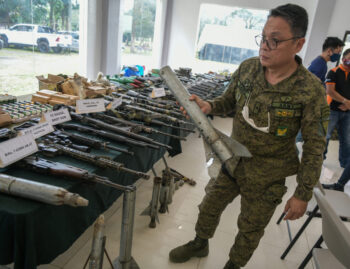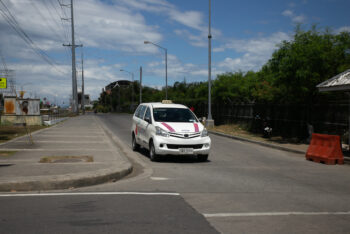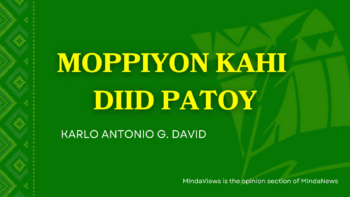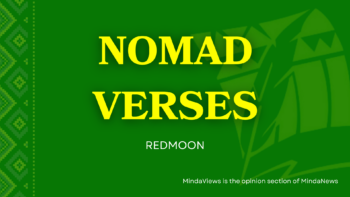DAVAO CITY (MindaNews/31 August) — It’s easy enough to heap abuse on the President now.
And with the newly inaugurated government website courtesy of the hip and techno-savvy communications team, the President is getting expressions of displeasure directly from his bosses.
Such language. I cringe at the liberty some people take in crafting choice words to call my president. And mostly from the very people who voted him into office.
I did not vote for him. I did not think that someone who has had no executive background and who has demonstrated an inability to make relational commitments would make a good president.
Never mind that now. The matter was taken out of my hands and this man is now my president.
People voted for him because he is the son of his parents, because media giants spun unintelligible stories that left the unthinking with the notion that we had no other choice. Or maybe because the yellow noose he sported awakened some subliminal thanatotic impulses. Voters measured him not on his potential to become a decision maker in crisis
situations, despite the fact that this nation is in crisis and has been for some time. Or perhaps because, like this nation, the man needs an optometrist and a makeover. People voted him in because of the belief that he would not steal, cheat or tolerate Kris.
All the wrong reasons. Let me count the ways.
I fear that we did not make him work too hard for the presidency. As with seemingly everything else in his life, the presidency was handed to him with little need for him to fight for it. As a consequence, the presidency and its attendant rights and obligations are matters that my president seems to think he can choose to take at his comfort and
convenience.
His reluctance to take the trappings that go with the position goes beyond self-effacing humility. Every time he courts security breach, he puts the presidency in danger. This evidences how little regard my president has for public interest and welfare, that he can entertain whimsy about where to live, how to travel, and what to eat, as if his life in the next six years were his own.
It is to my president’s comfort perhaps that many government agencies are still leaderless, still awaiting his convenience at identifying people to fill the positions. The choice has been effectively reduced to the need for his personal stamp of approval. This from the man who claims an aversion to micro-managing man-made disasters as they unfold.
Well, I guess it is the president’s prerogative to choose which concern he prefers to micro-manage.
Just right now, from where I am sitting, I get the impression that the shakeup in many crucial institutions, while intended to position the president’s men to deliver public service the president’s way, is just serving to demoralize the staff and to confuse the public. In the end, nothing gets done.
It’s enough for one man at least to get fed up with the lack of service.
Did Rolando Mendoza have an inkling how much damage he would cause? On hindsight, wouldn’t it have been more prudent to give the man entitlement to his retirement benefits?
I wish not to argue the finer points of Mendoza’s felt injustice that ended badly for many people – the rest of us included. I just think that such potential for mayhem could have been channeled to more productive ends. Such daring panache, such eye for detail in planning
and execution, such capacity to endure the onerous weight of stress at going it alone longer than six hours under those tension-fraught conditions could have been employed for better ends in ensuring the safety and security of our communities.
This is not to romanticize Mendoza and the choice he made to push to envelope. I only have his August 23 actions to go by in profiling the man, but from what I could infer, he was indeed remarkable in making us all sit up and take notice.
Benevolent circumstances would have made a hero of a man like that. Dire circumstances made him our worst nightmare.
Days after the tragic bus hijack, I find myself working out how it could have ended differently. The man had been controlled and reasonable up to a certain point. You could read it from the even writing on the notes he posted on the windshield and from the choices
he made as to those hostages he released to the negotiators. We just blew it with the combined stimulus overload that pushed him past reason.
I note that even as his mental health was deteriorating, the man stayed with his commitment to see it to the end. He could have benefited from early intervention months before he commandeered that tour bus, but all that fall under the heading of things that never got done.
Mendoza reminds me of Tony Ajero’s question at a recent luncheon meeting of the Rotary East. Tony asked me to comment on the work-related stress of policemen and whether such contributes to the policemen being implicated more frequently than soldiers on matters of
domestic and community violence. With no policemen in attendance then, I did not feel it fair to air my views for public consumption, and while I answered the question, I did ask the body then not to quote me.
Tony might be right in his observation that policemen figure more in community-related violence than do individual soldiers. That’s because our policemen are immersed in our communities – they go home every night to residences in the communities – and are the first to be called to confront violence happening there. Community violence is a milieu familiar to them and their homes are not demarcated from this milieu.
Soldiers, on the other hand, stay in barracks and are only let out on pass or on a mission upon the authority of their commanding officers.
Then, too, every day of their lives, policemen decide on their own whether or not to exercise violence. The choice is always there for them as they directly confront due cause; and the one who calls on it more often is one who has less resistance to employing it for his
purposes even in situations that are not work-related.
A soldier, on the other hand, only fires on command. He is seldom in a position to decide on his own when to pull the trigger. He doesn’t go to war everyday. And even when he does, for the most part, he does his duty by presenting just the mere readiness to unleash violence.
For both the policeman and the soldier, confronting community violence lends them the opportunity to be the hero to the rest of us. As either stands between us and the threat of violence posed by some ill-meaning elements out there, the man in uniform shields us and allows us to live the life we take as our due. Heroes among them are never divorced
from the communities they commit to serve over and beyond the call of duty.
Heroism is not a genetic endowment. It is, above all, a relational commitment. Heroism lies not in one’s reluctance to commit to serve public interest before one’s comfort and convenience. Heroism lies not in the oath not to steal, cheat, or tolerate Kris. As we are finding out, those could just very well be our worst nightmare.
Ah, well. This nation voted this non-hero into office. Good citizenship requires that we babysit him until he’s fit to lead this nation. Let’s hope he’s done counting the ways the past president did not make the grade. Maybe by now he’s learned from her mistakes,
enough at least to let him get his act together. (Wayward and Fanciful is Gail Ilagan’s column for MindaViews, the opinion section of MindaNews. Ilagan teaches Social Justice, Family Sociology, Theories of Socialization and Psychology at the Ateneo de Davao University where she is also the associate editor of Tambara. You may send comments to gail@mindanews.com. “Send at the risk of a reply,” she says).







